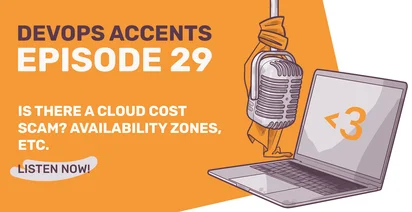Is There a Cloud Cost Scam? Availability Zones, Egress Fees & Background Jobs |🎙️#29

In this episode of DevOps Accents, Leo and Kirill are all about cloud costs, the main topic of mkdev content in January.
- Availability zone fees are annoying;
- What's scammy and what is clear about cloud closts?
- Are there people whose job it is to track cloud expences?
- Why aren't cost analysis features turned on by default?
- Is all of this common knowledge?
- When do companies decide to optimize their cloud costs?
- Do you need to worry about background jobs?
- How to educate yourself on cloud costs?
You can listen to episode 29 of DevOps Accents on Spotify, or right now:
In the dynamic world of DevOps and cloud computing, understanding the intricacies of cloud infrastructure costs and optimizing them for efficiency and scalability is paramount. This article delves into the nuanced discussions around cloud costs, particularly focusing on data egress fees, and strategies for cost optimization in cloud infrastructure, drawing insights from experienced DevOps professionals.
The Enigma of Data Egress Fees
The concept of data egress fees, charges applied by cloud providers for transferring data out of their cloud environments, has become a hot topic among DevOps communities. This practice, seen by some as a monetization strategy by cloud giants, impacts how businesses manage and strategize their cloud expenditures. The discussion brings to light the variability of these fees and their significant impact on operational costs, particularly when data needs to be moved across different regions or out of the cloud provider's network.
Strategies for Cloud Cost Optimization
Cost optimization in the cloud is not just about cutting expenses but about smartly allocating resources to maximize efficiency and performance. Insights shared by DevOps experts highlight several strategies, including:
- Understanding Cloud Billing: Getting to grips with the detailed billing mechanisms of cloud providers can unveil opportunities for savings. This involves being aware of the cost implications of different services and usage patterns.
- Leveraging Tools for Visibility: Utilizing cloud provider tools to gain visibility into where costs are being incurred is crucial. Services like AWS Cost Explorer and budget alerts can help monitor and manage spending more effectively.
- Optimizing Resources: This can involve selecting more cost-effective resources for certain tasks (e.g., choosing the right type of storage) or scaling down resources during low usage periods to reduce costs.
- Architectural Decisions: Making informed decisions about the architecture of cloud-based systems, such as serverless vs. containerized services, can have a profound impact on costs. Each has its own set of benefits and cost implications, requiring a thorough analysis to determine the most economical approach for a specific use case.
- Data Transfer and Storage: Strategies to minimize data transfer and storage costs include compressing data, reducing unnecessary data movement, and using in-region services to avoid cross-region charges.
Cloud infrastructure costs can quickly spiral out of control, leaving you with unexpected expenses. That’s why we’re offering a Free Cloud Cost Audit — to help companies uncover hidden inefficiencies and optimize their cloud spending. Our goal is simple: empower you with actionable insights so you can take control of your cloud budget.
Learn more about the audit and how we can help here, or fill in the application for right away:
The Critical Role of DevOps in Cost Management
DevOps professionals play a crucial role in managing cloud costs, as they possess the technical knowledge and skills to implement cost-effective solutions. They are tasked with the continuous evaluation of cloud services, ensuring that the infrastructure meets the needs of the business while staying within budgetary constraints. Furthermore, they contribute to strategic planning by providing insights into how cloud costs can be optimized without compromising on performance or scalability.
Conclusion
As cloud technologies continue to evolve, so too do the strategies for managing and optimizing cloud costs. The insights provided by experienced DevOps professionals underscore the importance of a proactive approach to cost management. By understanding the nuances of cloud billing, leveraging the right tools, and making informed architectural decisions, businesses can significantly reduce their cloud expenditures while still benefiting from the scalability, flexibility, and performance that cloud services offer. The journey towards cost-effective cloud infrastructure is ongoing, and staying informed and adaptable is key to navigating this complex landscape successfully.
Podcast editing: Mila Jones / milajonesproduction@gmail.com
